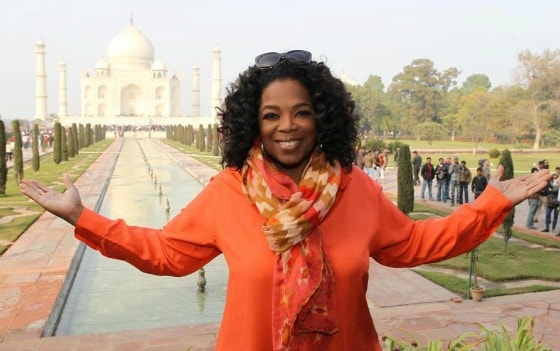The gaffe heard round the world
Oprah shows a lack of cultural sensitivity in India
Have you heard about the Oprah in India controversy? In case you missed it, Oprah was in India last winter and she taped a television special while there. It was shown recently and some of her comments have caused a lot of people to get very exercised. Oprah said something that writers and decent people try to avoid; she said something that showed ignorance of the culture and, to some, an attitude of superiority; she said something dumb that anyone new to a culture might say. She said, to the Somani family, who she was visiting to experience her first traditional Indian meal:
“I’ve heard that some Indians still eat with their hands.” So why is this such blunder?
I assume Oprah did not know that. Or maybe she did, and she nevertheless thought that when they become more sophisticated they would move on up to a knife-and-fork.
I have to admit that on the one hand (pardon the pun) I thought the remark was stupendously ignorant, verging on what I call cultural imperialism — especially coming from someone as worldly as Oprah; someone known for being humanistic, who says, “my heart is my brand.” On the other hand, in truth, anyone could make a gaffe like that — except for most of us, it’s not done on prime time television, to the scrutiny of millions.
As someone who writes about India a lot, I am not surprised by the backlash. The country is still in recovery from 250 years of British occupation; they still, not surprisingly, have a post-colonial hangover. Oprah said, “I certainly did not expect the velocity of the schadenfreude.” Now THAT’S a sophisticated remark! Very hard to believe the same person who said, “the velocity of the schadenfreude” also said, “I’ve heard some Indians still eat with their hands.”
But I don’t think that’s the point; I don’t think many of the people who were hurt and angered by the remark were lying in wait for Oprah to fail. I think they expected someone who has money, power and a large television crew behind her to have more awareness and sensitivity.
I appreciate that Oprah went to India as a journalist, and covered it with her American audience in mind, always retaining her sense of outsider, of “other” — which is what journalists do. But by doing so she objectifies the people she is “covering” and doesn’t seem to relate to them. It really comes across in this clip, when she visits the Hegde family, who live in a 10 x 10 room in a Mumbai slum. She hammers them with questions about how hard their life must be, meanwhile not noticing they are happy and smiling. This is the reason I am not a journalist.
Personally, I try to relate to the people when I travel in India, and I don’t go with the idea that I am better or more superior. I may or may not have something to teach the people I meet — but most of the time, I feel I am the one who is learning.
I’m not a big fan of Oprah, though I appreciate her efforts to promote a more humanistic approach to life than you usually see on daytime television. I’m not at all surprised by the result of her contact with India and the controversy that has trailed it. Though I wish she could have raised the bar, and depicted India with more sensitivity — using her platform to show the true beauty of India — she actually seemed like a blunt instrument in a land of iridescent fluidity.

Mariellen Ward is a freelance travel writer whose personal style is informed by a background in journalism, a dedication to yoga and a passion for sharing the beauty of India’s culture and wisdom with the world. She has traveled for about a year altogether in India and publishes an India travel blog, Breathedreamgo.com. Mariellen also writes for magazines and newspapers.









